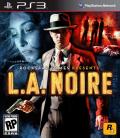Review: L.A. Noire
 It's June and L.A. Noire is the first game I've actually played this year. Would've been Dead Space 2 except a bizarre bug prevented me from getting very far, so, great jobs guys. I'll try to keep the spoilers to a minimum in this review.
It's June and L.A. Noire is the first game I've actually played this year. Would've been Dead Space 2 except a bizarre bug prevented me from getting very far, so, great jobs guys. I'll try to keep the spoilers to a minimum in this review.
I'm trying to decide whether it's possible to enjoy a game but not actually like it. Rockstar Games has put out some bestselling titles over the years, and L.A. Noire is bound to be a strong Game of the Year contender. But L.A. Noire is a bit like Avatar - you can be dazzled by the visual world you're immersed in if you can also overlook some serious issues.
L.A. Noire has a solid plot. In fact, the narrative is one of the best part of the game, weaving together several storylines in a way that works in a videogame. You play as Cole Phelps, a young detective who moves through different parts of the LAPD, from patrol to traffic, homicide, vice, and arson. Unlike the Grand Theft Auto games, you're on a different side of the law now and you're spending most of your time solving crimes. Although it's released by Rockstar, this isn't much of a car chasing game (although there are a few of those); the key game mechanic here is using your intuition to solve crimes.
Simuliating human behavior
Which comes to the trickier and most ambitious part of the game: simulating human communication. The game used motion capture technology to capture minute details of the actors' facial expressions, including eye contact, body language, gestures, and other facial expressions. There are two problems I have with their approach. The first is the assumption that people who lie don't look you in the eye and start to fidget more, and that people who are telling the truth give you a steady gaze. Most of you should realize that this is already a problematic assumption because different cultural groups have different feelings about eye contact, and much of it also depends on individual differences. The second problem is what you have to do after you detect lying. During interrogation scenes, you have three choices to make: 1) Truth, 2) Doubt, and 3) Lie. When you select "Truth," you're assuming that the witness or suspect is being truthful and you move on with your questions. When you select "Doubt," you believe the suspect is holding something back but you don't have the evidence to argue that. When you select "Lie," you know the suspect is lying and you have the evidence to prove it. The problem with the third choice is having to connect the lie to a piece of evidence. This is done by going through your notebook's list of evidence and picking one that you can use as "proof." The game doesn't clearly tell you what can be used as proof so it's up to the player to decide that. Of course, the game designers have in their mind what is the right answer, so it's up to you to guess what's on their minds.
For me, the challenge wasn't between identifying who's telling the truth; the game makes that pretty straightforward. The challenge was between the oftentimes arbitrary distinctions between "Doubt" and "Lie," and between what the game designers have decided to be evidence of lying. At times, it's like trying to do a really bad multiple choice test, where you're punished for thinking too much.
One thing that I wished the game designers hadn't done is to tell you how many questions you got right. Initially, that made me want to get all the answers right and, when I got frustrated by the arbitrariness of the questions, I was tempted to look them up on the Internet. Fortunately, I didn't 'cause that started to take the fun out of the game even more, so I just let myself go with my instincts, even if that meant getting more answer wrong. One other thing is that, despite being a key innovation in the game, the interrogations actually don't matter. In other words, you could get every question wrong and that still doesn't stop you from moving forward in the game. You might get yelled at and your rank might rise more slowly, but none of that really matters. Rank means nothing in the game. You don't get more or less respect, better or worse weapons, smarter or dumber partners. Rank, which is a bit like "experience" in roleplaying games, is meaningless beyond adding trivial things such as the ability to change into a different suit.
Having finished the game, I've developed mixed feelings about it. Anyone who tries to use this game to "teach" human communication would be very naive and misguided because the game oversimplifies it to a comical degree. At the same time, the game was a lot of fun and, short of a few silly plot holes, was quite enjoyable to play. I fully expect a follow-up to the game and perhaps the game designers could polish up some of the game mechanics in that one. For now, I can only say that L.A. Noire is one of the most beautiful and ambitious game I've played and just barely missd its target.